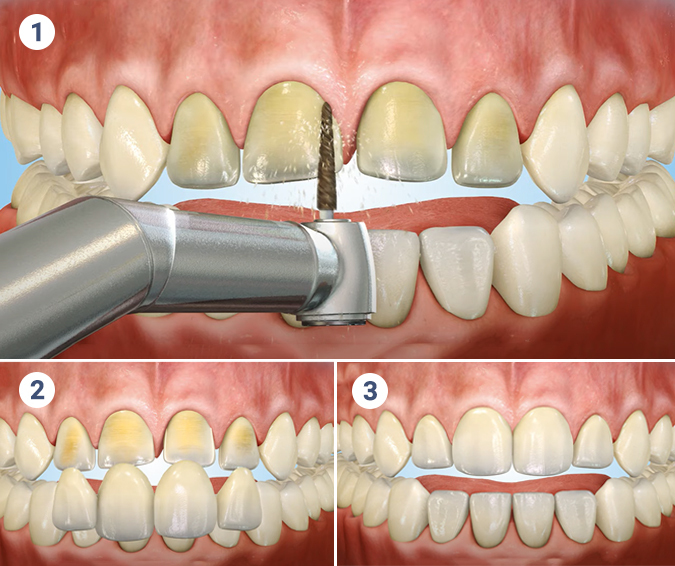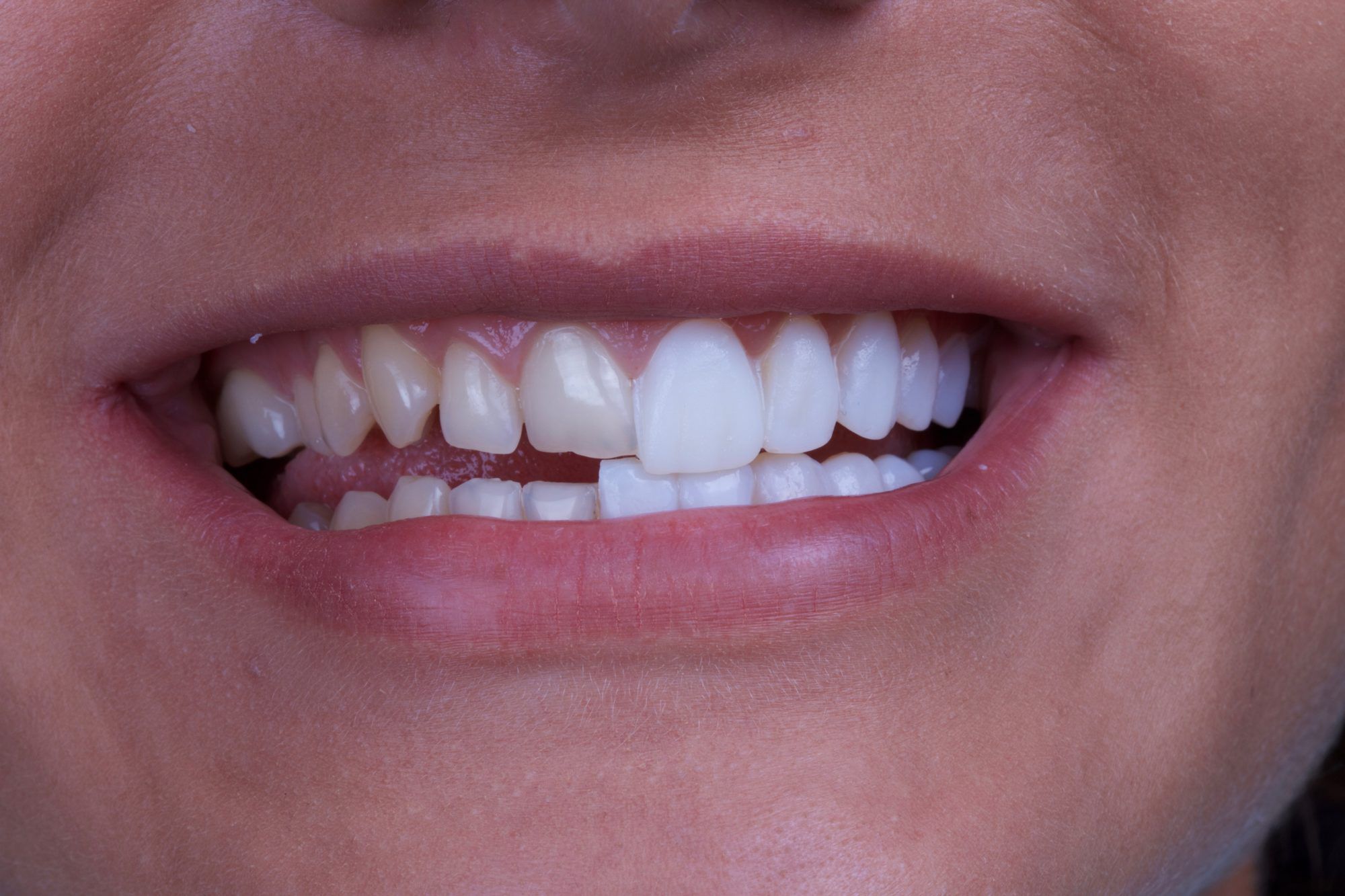Porcelain Veneers: Pros, Cons, and How They Compare to Composites
The Total Introduction of Veneers: Kinds, Uses, and Their Effect on Your Smile
Veneers act as a preferred solution for people seeking to enhance their dental appearances. These custom-crafted shells can properly mask blemishes such as staining and spaces. With 2 primary types available, porcelain and composite resin, each offers distinct advantages and restrictions. The effect of veneers prolongs beyond simple appearance, affecting self-confidence and social interactions. Understanding their benefits and kinds is necessary. What might this indicate for one's total lifestyle?
Comprehending Veneers: What They Are and Just how They Work
Veneers are slim shells, usually made from porcelain or composite material, that are custom-crafted to fit over the front surface of teeth. They serve both useful and visual purposes, giving a service for numerous dental flaws such as staining, gaps, and minor imbalances. By sticking to the tooth enamel, veneers produce an all-natural look while boosting the form and shade of the teeth.
The procedure usually involves a first examination, where a dental expert examines the patient's needs and talks about wanted outcomes - Porcelain Veneers Dentist. Following this, a very little quantity of enamel may be gotten rid of to fit the veneer. Impacts of the teeth are then taken to ensure a specific fit. Once made, the veneers are bonded firmly to the teeth making use of a special oral adhesive. This treatment not just improves the smile's appearance but likewise assists secure the underlying teeth from more damages, making veneers a popular option for several looking for a smile transformation
Kinds of Veneers: Porcelain vs. Composite Resin
The distinction between porcelain and composite resin veneers depends on their product composition and qualities. Each type supplies varying levels of longevity, cost, and longevity, affecting people' options based on their private demands. Comprehending these distinctions is essential for making an educated decision regarding oral improvements.
Material Differences Discussed
While both porcelain and composite resin veneers serve the exact same cosmetic objective, they differ substantially in product homes, sturdiness, and aesthetic results. Porcelain veneers are crafted from a ceramic material that simulates the natural transparency of teeth, supplying a lifelike appearance. Their smooth surface area is resistant to discoloration, making them an appealing alternative for those seeking a resilient visual. In contrast, composite resin veneers are made from a tooth-colored plastic product, providing adaptability and simplicity of application. They may not attain the same level of brightness or clarity as porcelain. Furthermore, composite veneers can be extra quickly formed and fixed, making them a much more flexible alternative in particular dental circumstances. Each type presents unique advantages customized to private choices.
Long life and Resilience
When contrasting porcelain and composite material veneers, longevity and longevity are significant variables. Porcelain veneers are understood for their stamina, commonly enduring 10 to 15 years with proper treatment. Their durability against staining and damaging makes them a popular selection for people looking for lasting outcomes. On the other hand, composite material veneers commonly have a much shorter life expectancy, balancing 5 to 7 years. While they can be repaired much more quickly if harmed, they are extra at risk to use and staining in time. The option in between these products typically depends upon the individual's lifestyle, visual goals, and maintenance choices. Eventually, comprehending the distinctions in long life and resilience can direct people in choosing the veneer type that finest matches their demands.
Expense Contrast Insights
When choosing between porcelain and composite material veneers, price is an important consideration. Porcelain veneers usually range from $800 to $2,500 per tooth, mirroring their resilience, visual charm, and resistance to staining. These veneers call for a much more substantial procedure and specialized laboratory job, adding to their greater cost tag. On the other hand, composite resin veneers are typically much more inexpensive, setting you back in between $250 and $1,500 per tooth. They can be applied in a single see, which reduces labor prices. However, composite veneers might require much more constant replacements, potentially enhancing long-lasting expenditures. Eventually, the selection between porcelain and composite resin veneers relies on private budget plans and preferred results, balancing preliminary expenses versus long life and visual results.
The Benefits of Deciding On Veneers for Your Smile
Selecting veneers provides substantial advantages for those looking for a boosted smile. Their improved visual allure can change the look of teeth, while their stain-resistant residential or commercial properties guarantee a long lasting illumination - Porcelain Veneers. This mix makes veneers a preferred alternative for individuals looking to achieve a remarkable smile
Improved Visual Appeal
When individuals seek to improve their smiles, veneers usually emerge as a favored service because of their transformative visual benefits. These thin coverings, typically made from porcelain or composite material, can properly hide imperfections such as chips, voids, and imbalance. By mimicking the natural look of teeth, veneers supply a seamless, radiant smile. Their adjustable nature enables a customized method, enabling people to choose tones and shapes that best fit their facial features. Furthermore, veneers can develop an uniform look, boosting total face proportion. This aesthetic enhancement not only enhances self-confidence however can also favorably affect individual relationships and social communications, making veneers a popular option for those seeking to achieve a brighter, extra appealing smile.
Tarnish Resistance Conveniences
Veneers not only enhance visual charm but likewise supply significant discolor resistance, making them an eye-catching alternative for individuals concerned about preserving a bright smile. Composed of resilient materials such as porcelain or composite material, veneers are less permeable than all-natural teeth, which assists avoid the absorption of stains from typical culprits like coffee, tea, and red wine. This intrinsic tarnish resistance enables people to appreciate their favored drinks without worrying regarding staining. Porcelain Veneers. Additionally, the smooth surface of veneers makes them simpler to tidy, additional improving their longevity and maintaining their beautiful appearance. Therefore, veneers give a site link sensible solution for those seeking both charm and performance in their dental care
The Process of Getting Veneers: What to Expect

The process of obtaining veneers might appear intimidating, understanding the actions involved can ease issues. Initially, a consultation with a dental practitioner is required to identify if veneers are the suitable remedy for the person's dental problems. Throughout this appointment, the dental expert will certainly talk about preferred outcomes and take impressions of the teeth.
Next off, a 2nd visit is set up for tooth prep work, where a percentage of enamel is typically eliminated to fit the veneers. Momentary veneers might be placed while the customized ones are crafted in a dental laboratory, which normally takes a number of weeks.
As soon as all set, the dental professional will put the veneers, guaranteeing proper fit and shade before bonding them to the teeth utilizing a special adhesive. After final changes, the dental professional will certainly supply guidance on treatment. Understanding these steps can assist individuals really feel a lot more comfy and informed throughout the veneer process.
Upkeep and Take Care Of Your Veneers
Keeping veneers calls for constant like assure their longevity and appearance. Correct dental hygiene is crucial; brushing two times daily with a non-abrasive toothpaste and flossing frequently help avoid plaque buildup around the veneers. Furthermore, regular dental examinations are important for monitoring the condition of the veneers and attending to any kind of potential problems beforehand.
When attacking to protect against damages, people should avoid difficult foods and extreme force. It's also advisable to limit consumption of discoloring substances, such as coffee, tea, and merlot, as these learn the facts here now can affect the veneers' color over time.

Changing Your Smile: Real-Life Effect of Veneers
A glowing smile can significantly enhance one's self-confidence and general appearance. For several individuals, veneers offer as a transformative option, effectively dealing with numerous oral worries such as staining, voids, and misalignment. These thin shells, tailor-made to fit over the front of the teeth, can produce a harmonious and visually pleasing smile.
Real-life situations show the profound effect veneers can have. Individuals commonly report an instant boost in self-esteem and social interactions following their procedure. The newfound self-confidence can result in even more chances in personal and expert life, as individuals really feel more likely to involve and share themselves.
Additionally, the emotional advantages extend past plain look; lots of experience enhanced mental well-being as they welcome their smiles. Veneers not just enhance physical characteristics however likewise add substantially to overall high quality of life, highlighting their value in aesthetic dentistry.
Regularly Asked Inquiries
For How Long Do Veneers Normally Last Before Requiring Replacement?
Veneers commonly last between 10 to 15 years prior to requiring substitute. Factors such as oral hygiene, oral routines, and the sort of material utilized can influence their long life and general durability. Regular oral exams are recommended.
Can Veneers Be Removed, and if So, How?
Yes, veneers can be removed. A dental practitioner normally makes use of specialized devices to meticulously detach them from the teeth, making certain marginal damages to the underlying enamel, typically adhered to by necessary modifications or reconstructions for perfect aesthetics.
Are Veneers Suitable for Everyone's Dental Condition?

Will Obtaining Veneers Hurt or Require Anesthetic?
Getting veneers usually includes minimal pain, and many people receive neighborhood anesthesia to assure a pain-free experience. Sensitivity may happen momentarily afterward, however the majority of find the process bearable and are satisfied with the results.
Exactly How Do Veneers Affect Tooth Level Of Sensitivity After Positioning?
Veneers can temporarily enhance tooth level of sensitivity as a result of the removal of enamel and the bonding procedure. Many visit this website people experience a reduction in level of sensitivity gradually as the teeth get used to the new veneers.
Veneers are slim coverings, typically made from porcelain or composite resin, that are custom-crafted to fit over the front surface of teeth. Porcelain veneers are crafted from a ceramic material that simulates the all-natural transparency of teeth, providing a natural look. Porcelain veneers typically range from $800 to $2,500 per tooth, showing their durability, aesthetic charm, and resistance to discoloration. In comparison, composite resin veneers are typically extra budget friendly, costing between $250 and $1,500 per tooth. Composed of durable materials such as porcelain or composite material, veneers are less porous than all-natural teeth, which assists avoid the absorption of discolorations from usual offenders like coffee, tea, and red a glass of wine.